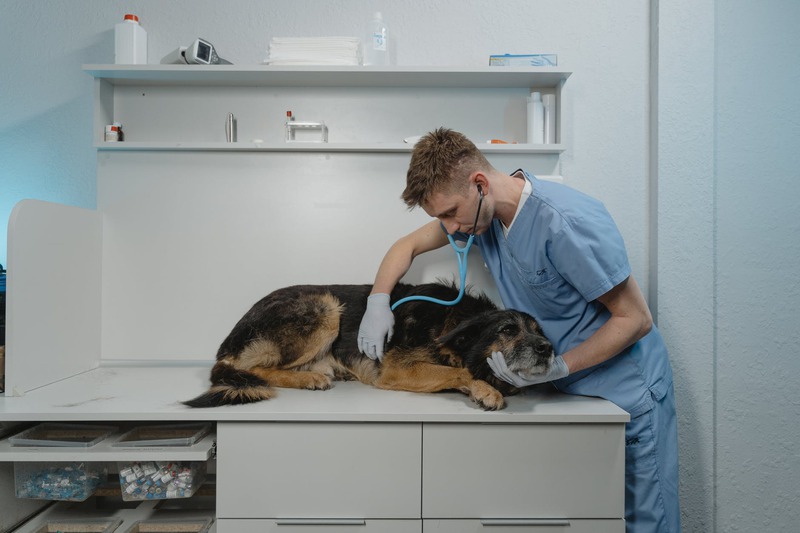When it comes to the health and well-being of our beloved pets, we often rely on the expertise and care of a full-service veterinary facility. These institutions are havens for pet health, offering comprehensive medical, surgical, and preventative care for animals.
But who exactly provides this care? A full-service facility isn’t just a building filled with medical equipment; it’s a dynamic team of dedicated individuals working together to ensure the best possible outcome for every animal that walks through their doors.
1. The Veterinarians
At the core of a full-service veterinary facility are the veterinarians. These highly trained medical professionals are the ones who diagnose illnesses, perform surgeries, and manage the overall medical care of pets. Their extensive education, which includes a Doctor of Veterinary Medicine degree, equips them with the knowledge to tackle a plethora of conditions affecting animals. Even in the most challenging situations, veterinarians are committed to providing the utmost care and treatment.
2. Veterinary Technicians and Nurses
-
Veterinary Technicians: Often likened to registered nurses in the medical field, these individuals perform essential tasks such as drawing blood, administering medications, and assisting in surgeries.
-
Veterinary Assistants: These professionals typically handle the day-to-day care of pets, such as feeding, cleaning, and providing comfort.
3. Receptionists and Client Service Representatives
The front-of-house staff, which usually consists of receptionists and client service representatives, is vital to a full-service veterinary facility. They are responsible for scheduling appointments, greeting pet owners, maintaining medical records, and providing general information. Their role is pivotal in creating a welcoming and organized environment.
4. Specialized Care Providers
In addition to general practitioners, a full-service veterinary facility often houses specialists in areas such as cardiology, dentistry, dermatology, ophthalmology, and orthopedics. These professionals offer an advanced level of care that extends beyond the scope of regular veterinary practice, ensuring that all health issues, no matter how complex, can be addressed under one roof.
5. In-House Laboratory Analysts
State-of-the-art facilities boast in-house laboratories staffed by skilled analysts. These team members conduct a variety of tests, such as blood work and urinalysis, to aid veterinarians in diagnosing and treating pets. Their ability to deliver quick and accurate results is crucial to the reasonable care of your furry friend.
6. Dedicated Surgical Teams
-
Surgical Veterinarians: These are the vets who undertake the most complex and invasive procedures, demanding extensive expertise and a steady hand.
-
Anesthesiologists: They play a critical role in managing the pain and consciousness of animals during surgical procedures.
-
Surgical Technicians: They prepare the operating rooms, sterilize equipment, and ensure everything runs smoothly during surgery.
A Blend of Technology and Compassion
These hospitals stay abreast of the latest veterinary techniques and treatments, providing pets with a range of services from routine examinations to complex surgeries. In these hospitals, you’ll find a trusted Santa Barbara vet who not only possesses a wealth of medical knowledge but also an understanding heart, essential for the healing of our four-legged companions.
Alternative Care and Rehabilitation
Modern full-service veterinary facilities are expanding their horizons to offer complementary therapies. These may include services such as acupuncture, chiropractic care, and physical rehabilitation. Trained practitioners provide these therapies to enhance recovery from illness or injury, manage chronic conditions, and improve the overall quality of life for pets.
The Delicate First Steps
Welcoming puppies and kittens into the world and ensuring their growth into healthy adult pets is a critical aspect of veterinary care. Your local puppy vet plays a significant role in this stage, offering services like initial health screenings, nutritional advice, and behavioral counseling. Starting these young pets on the right paw involves thorough examinations and a gentle touch, setting them up for a lifetime of wellness.
The Backbone of Full-Service Veterinary Care
The seamless operation of a full-service veterinary facility is not attributed to just one professional but rather a synergetic effort of various individuals. Behind every successful procedure or recovery story, there’s a team of passionate caregivers, including veterinarians, technicians, receptionists, laboratory analysts, and support staff. They work together, driven by a shared devotion to animal health and the bond between pets and their human families.
Protecting Your Furry Family Members
Preventative medicine is a cornerstone of veterinary care, and vaccinations and parasite prevention stand at the forefront of this mission. Keeping your cat protected from serious diseases is a responsibility that veterinary facilities take seriously.
Services such as cat health and vaccinations at San Roque Pet Hospital are essential in guarding against common threats like feline leukemia, rabies, and a variety of parasite-borne illnesses.
Final Thoughts
A full-service veterinary facility is more than just a building; it is a sanctuary led by a dynamic team providing compassionate, comprehensive care to animals in need. From our furry friends’ first step into the world to their seasoned years, these facilities and their dedicated staff are equipped to handle every aspect of veterinary medicine. It’s the synergy of their expertise and empathy that makes a trusted facility an invaluable asset to the community and the lives of our pets.


